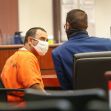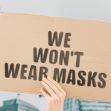COVID-19 is wreaking havoc on the U.S. incarceration system. Multiple COVID-related lawsuits, brought forth by prisoners, are percolating through courts across the country. At the center of theses suits lie allegations that prison workers are neglecting inmates' safety and exposing them to unsafe conditions.
Officials claim that they're doing their best to meet the challenges posed by the pandemic. Inmates disagree. However, they're not free to voice their complaints in the same manner that non-incarcerated people are. Federal law forces them to engage in a tedious grievance process designed to weed out frivolous litigation. The system gives prison officials a chance to rectify the problem before it reaches the court. It wasn't created with the demands of a continually evolving health crisis in mind. A process that generally functions smoothly, inmates and activists argue, is now dangerously ineffective.
The Supreme Court Enters the Fray
Inmates began raising concerns at the beginning of 2020, but the first appeal didn't reach the Supreme Court until spring.
"It has long been said that a society's worth can be judged by taking stock of its prisons," Supreme Court Justice Sonia Sotomayor wrote in May. "That is all the truer in this pandemic, where inmates everywhere have been rendered vulnerable and often powerless to protect themselves from harm."
Sotomayor was writing about a class-action lawsuit filed against the Texas Department of Criminal Justice (TDCJ). Upon reaching the Supreme Court, the justices ruled in favor of the prison system, finding that "there is no evidence that TDCJ's COVID-19 measures are inadequate…" Sotomayor agreed with the majority decision but cautioned that the struggle wasn't over.
"As the circumstances of this case make clear, the stakes could not be higher," she added.
James S. Gwin of the United States District Court for the Northern District of Ohio, in a separate case, accused the state's Bureau of Prisons of neglecting its most vulnerable inmates and ruled that it must transfer them to home confinement. In response, Solicitor General Noel Francisco filed a petition asking the Supreme Court to block Gwin's ruling.
"A judicial order peremptorily requiring the removal of over 800 inmates from a federal prison based on an alleged Eighth Amendment violation -- in the midst of a pandemic -- presents extraordinarily significant questions and should not be imposed without this Court's review," Francisco argued.
The court eventually declined to act, leaving Gwin's order in place.
The Allegations
When infection runs rampant, prison populations are particularly vulnerable due to their confined environment. Social distancing measures are difficult to enforce.
"COVID-19 is raising fundamental issues about prisoners' right to minimal standards of health and safety and human decency," David Fathi, the director of the American Civil Liberties Union's (ACLU) National Prison Project, explained. "It's inevitable that these cases will occupy the courts, including the Supreme Court, for the foreseeable future."
In June, the ACLU of Connecticut reached a settlement with the state over a pandemic-related prison lawsuit. The terms of the agreement force the prison system to provide antiseptic cleaning supplies and personal protective equipment to inmates. It also asks officials to prioritize the release of non-violent inmates deemed medically vulnerable.
"Overcrowding, deplorable conditions and inadequate access to healthcare makes jails and prisons ripe for infectious diseases, " Civil Rights Corps spokeswoman Kiara Pesante Haughton said. "It's no surprise that during this global pandemic, we're seeing COVID-19 spread viciously through these facilities, making them 11 out of the top 15 outbreak hot spots in the nation."
According to the Equal Justice Initiative, the country's five largest coronavirus spikes are associated with prisons and jails. One hundred sixty thousand inmates and correctional facility staff members have contracted the disease since the start of the year. More than 1,000 have died. Lawmakers are stuck balancing the individual needs of each inmate with society's need for safety and stability.






